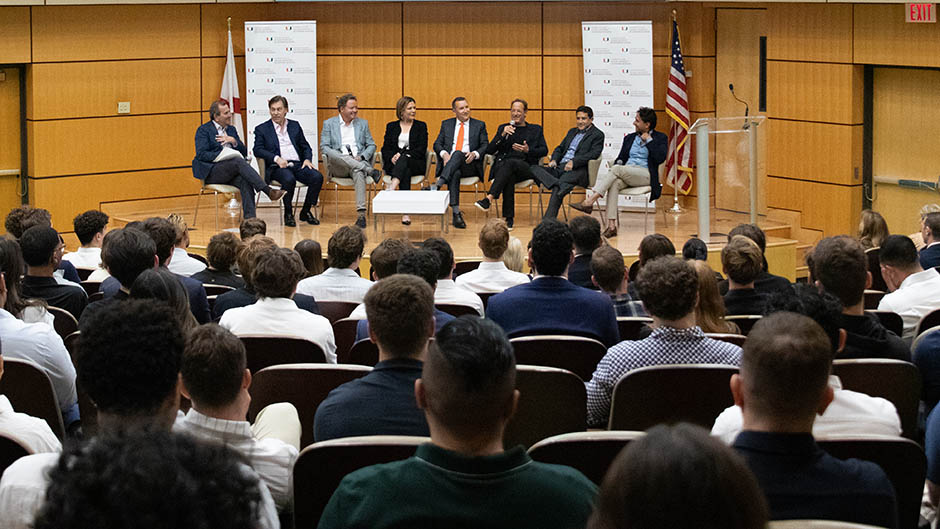Thought leaders dedicate their energy and gravitas to the University of Miami Patti and Allan Herbert Business School’s Accelerated MBA in Real Estate program, but their hectic schedules only allow them to gather a few times per year. When news spread that many would be on campus for a Business of Real Estate Roundtable, Miami Herbert students, appreciative of the opportunity, turned up in droves to listen and learn.
Perfectly understandable, given that the commercial real estate (CRE) luminaries onstage in Miami Herbert’s Storer Auditorium collectively controlled assets worth billions of dollars. Additionally, they’d all made money in Miami’s CRE marketplace during economic times both challenging and serene.
“This is a really sharp group, very successful,” observed Executive Managing Director of JLL Capital Markets Manny de Zarraga, BSCE ’83, MA ’83, who served as moderator. “All of us, pretty much, are members of the University of Miami Business School Real Estate Advisory Board. One of the best parts of our getting together is for us to talk and hear from each other as to what we’re seeing in the market.
As the Roundtable got underway, it quickly became apparent that most Miami CRE industry leaders didn’t feel the severe pandemic-related pain their colleagues around the country did. Agreeing with de Zarraga on that point were:
- Edgardo Defortuna, MBA ’82, President, Founder and CEO, Fortune International Realty
- Tere Blanca, BBA ’81, MBA ’83, Founder, Chairman and CEO, Blanca Commercial Real Estate
- Michael Comras, BBA ’83, President & CEO of The Comras Company, a full-service real estate brokerage and investment firm
- Warren de Haan, Co-Founder and CEO of Acore Capital
- Neil Shah, President & CEO of the Hersha Hospitality Trust
- Michael Sommers, BSF ’04, Senior VP for development and acquisition/Southeast, the Grand Peaks real estate investment firm
- Malcolm Butters, BBA ’82, CEO, Butters Construction & Development
When it was Warren de Haan’s turn to speak, the leader of Acore Capital momentarily gazed out at an audience comprised primarily of students.
“What I want you to leave with is: the rest of the country is not Miami, okay?” de Haan laughed. “So, spend your time reading things like the Wall Street Journal, the New York Times, the Economist. Get off your iPhone and pay attention to what’s going on outside of Miami. Because (not doing so) will give you a fake perspective of what’s going on in the economy.
“In South Florida, there’s a supply and demand imbalance, meaning that there’s greater demand for commercial real estate than supply.” de Haan said. “But as it relates to the rest of the markets, we really have to focus on the flows of capital. I want you to think about these bigger concepts. The flows of debt capital. Liquidity. The banking system.”
The head of Brickell-based Blanca Commercial Real Estate, Tere Blanca, observed that “Miami’s crushing it” in terms of being able to lease office space, but quickly added that “we are an anomaly. We have clients that have portfolios of office buildings all over the country and all over the world. And certainly, the stories in those markets are very different from what we are experiencing here.
“People want to live here, and employers follow where the people want to live,” said Blanca, who started her company in 2009. “So, for us in office, it’s about telling the story of why you should be here, and creating an environment that people want to show up to work in.”
Butters Construction & Development focuses on industrial real estate, primarily warehouses. CEO Malcolm Butters was all smiles while relating how “industrial became the darling” of the Miami CRE segment during the pandemic, because homebound consumers did lots of online shopping, propelling rivers of merchandise through Miami-area warehouses.
“We’re in the best market in the country,” Butters said. “Of all the CRE sectors here, probably industrial has the safest future in South Florida.” He explained that industrial is the least capital-intensive CRE category because warehouse owners don’t have to spend money embellishing their properties for tenants.”
Contrasting with Butters’ unbridled optimism, Hersha Hospitality Trust President and CEO Neil Shah sounded a cautionary note regarding how the pandemic dinged the hotel holdings of his Pennsylvania-based real estate investment trust. However, he had a key lesson for Miami Herbert students, namely that resiliency and adaptability are needed to prosper in the CRE space.
“Miami has been one of the best lodging markets in the country, I’d say for 20 years,” Shah said. “But still, this year compared to last year—in luxury and lifestyle hotels—our revenues are down probably 15 percent.
“So that makes it difficult, it makes it challenging,” Shah said. “And that’s what leads companies to sometimes look after a more permanent source of capital. We created a public platform to help us access capital that’s a little more permanent. Thanks to the benefits of having good lenders, of having good access to capital in the public markets, we were able to get through the pandemic.”
Michael Sommers disclosed that his real estate investment firm, Grand Peaks, has “bought about 2,700 apartments across Miami the past decade, more than anyone else on Earth! So, we have a pretty good view of what’s happening in the markets from a local demand perspective.”
The outlook in Miami is amazing, with most properties here, along with Broward and Palm Beach counties, 95 percent occupied, Sommers said. Thanks to an anecdote from another Business of Real Estate Roundtable participant, Sommers also gave Miami Herbert students a lesson on dedication.
Moderator Manny de Zarraga related that a decade or so earlier, he’d met a young executive who proudly mentioned that he caught airline flights to different cities during weekends, solely to eyeball apartment complexes recently acquired by his employers.
The name of that executive? University of Miami alumnus Michael Sommers, who at the time was working for a firm called Equity Residential.

